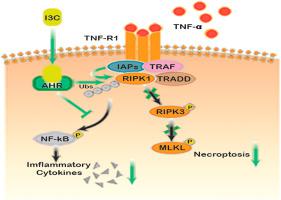Experimental Cell Research ( IF 3.3 ) Pub Date : 2021-05-17 , DOI: 10.1016/j.yexcr.2021.112638 Chunting Peng 1 , Chensi Wu 1 , Xiaolan Xu 1 , Liya Pan 1 , Zhuoqi Lou 1 , Yanhong Zhao 1 , Haiyin Jiang 1 , Zebao He 2 , Bing Ruan 1

|
Ulcerative colitis (UC) is a disease characterized by inflammation and disruption of the intestinal epithelial barrier. Necroptosis plays a critical role in disease progression. Indole-3-carbinol (I3C), a natural dietary agonist of aryl hydrocarbon receptor (AHR), has shown alleviating effects on UC. However, its mechanisms of action have not been comprehensively elucidated. Therefore, we aimed at investigating the protective role of I3C in DSS-induced colitis mice models. I3C significantly ameliorated body weight loss, colon length shortening and colonic pathological damage in colitis mice, reduced disease activity index (DAI) and histological (HI) scores, as well as alleviated colonic necroptosis and inflammation. In vitro, I3C attenuated necroptosis and inflammation of colonoids and NCM460 cells. AHR, activated by I3C, inhibits activation of receptor-interacting protein kinase 1 (RIPK1) and the subsequent assembly of necrosome in a time-dependent manner, as well as suppressing NF-κB activation and decreasing TNF-α, IL-1β, IL-6 and IL-8 expression. Silencing of AHR aggravated necroptosis and inflammation of NCM460 cells, and did not be ameliorated by I3C. Furthermore, AHR activation induces the expression of inhibitor of apoptosis proteins (IAPs) and the ubiquitination of RIPK1. In conclusion, I3C exerts a protective effect in DSS-induced colitis mice models by alleviating the necroptosis and inflammation of IECs through activating AHR.
中文翻译:

Indole-3-carbinol 通过激活芳基烃受体改善溃疡性结肠炎小鼠肠上皮细胞的坏死性凋亡和炎症
溃疡性结肠炎(UC)是一种以炎症和肠上皮屏障破坏为特征的疾病。坏死性凋亡在疾病进展中起着至关重要的作用。 Indole-3-carbinol (I3C) 是芳烃受体 (AHR) 的天然膳食激动剂,已显示出对 UC 的缓解作用。然而,其作用机制尚未得到全面阐明。因此,我们旨在研究 I3C 在 DSS 诱导的结肠炎小鼠模型中的保护作用。 I3C 显着改善结肠炎小鼠的体重减轻、结肠长度缩短和结肠病理损伤,降低疾病活动指数 (DAI) 和组织学 (HI) 评分,并减轻结肠坏死性凋亡和炎症。在体外,I3C 减轻了结肠样细胞和 NCM460 细胞的坏死性凋亡和炎症。 AHR 由 I3C 激活,以时间依赖性方式抑制受体相互作用蛋白激酶 1 (RIPK1) 的激活和随后坏死体的组装,并抑制 NF-κB 激活并减少 TNF-α、IL-1β、IL -6和IL-8表达。沉默 AHR 会加剧 NCM460 细胞的坏死性凋亡和炎症,并且 I3C 无法改善这种情况。此外,AHR 激活还会诱导凋亡蛋白抑制剂 (IAP) 的表达和 RIPK1 的泛素化。总之,I3C通过激活AHR减轻IEC的坏死性凋亡和炎症,从而对DSS诱导的结肠炎小鼠模型发挥保护作用。






























 京公网安备 11010802027423号
京公网安备 11010802027423号